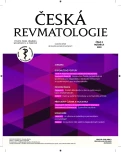What we should know about diagnostic tests
Authors:
H. Mann
Authors‘ workplace:
Revmatologický ústav, Praha
Published in:
Čes. Revmatol., 21, 2013, No. 2, p. 98-104.
Category:
Comments
Medicína je věda o nejistotě a umění pravděpodobnosti.
Sir William Osler
Overview
Diagnostic tests play a very important role in rheumatology. Despite the fact that we use them on daily basis, we often do not appreciate the influence of basic statistical principles on their interpretation. Rheumatic diseases are rare, therefore in order to avoid falsely positive results we have to order diagnostic tests only in patients with strong suspicion of a given disease. Understanding of diagnostic test characteristics and the basics of bayesian approach alows us to combine diagnostic tests in an effective manner in order to minimize costs and risks associated with ruling-in or ruling-out a disease.
Key words:
Diagnostic test, uncertainity, sensitivity, specificity, predictive value
Sources
1. Gross R. Making clinical decisions. ACP, Philadelphia 1999.
2. Fagan TJ. Letter: Nomogram for Bayes theorem. N Engl J Med 1975; 293 : 257.
3. Nishimura K, Sugiyama D, Kogata Y, et al. Meta-analysis: diagnostic accuracy of anti-cyclic citrullinated peptide antibody and rheumatoid factor for rheumatoid arthritis. Ann Intern Med 2007; 146 : 797-808.
Labels
Dermatology & STDs Paediatric rheumatology RheumatologyArticle was published in
Czech Rheumatology

2013 Issue 2
-
All articles in this issue
- Recommendations of the Czech Society for Rheumatology for the diagnosis and monitoring of patients with systemic lupus erythematosus
- The course of pregnancy in female patients with systemic lupus erythematosus
- Morning and evening chronotypes in rheumatoid arthritis
- Eosinophilic fasciitis
- Is ultrasound a reliable help for a rheumatologist?
- What we should know about diagnostic tests
- Czech Rheumatology
- Journal archive
- Current issue
- About the journal
Most read in this issue
- The course of pregnancy in female patients with systemic lupus erythematosus
- Eosinophilic fasciitis
- Recommendations of the Czech Society for Rheumatology for the diagnosis and monitoring of patients with systemic lupus erythematosus
- What we should know about diagnostic tests
